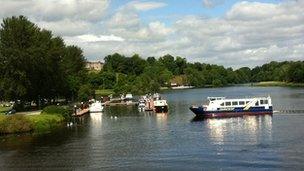G8 Summit: Farewell to Fermanagh
- Published
- comments
So, time to pack up after the G8 summit. The camera crews stow away their unused riot kits. I put my unused umbrella back into the car boot.
Outside on the Erne a flotilla of swans has taken up station where the police rigid inflatable boats used to patrol.
Will we get a tourist bounce from the G8 "infomercial" as David Cameron termed it? Will this soon be overshadowed by a tense summer on the streets? Did the NI Tourist Board sponsor the midges that plagued the Obama children at Glendalough (it wouldn't have happened on the Giants' Causeway)?
I don't have the answers - as Zhou Enlai said about the impact of the French Revolution "It's too early to tell".
Sitting in the PM's news conference yesterday I was always going to fulfil my brief to ask a NI-related question. But I fretted over whether I should go broadsheet and enquire about the relevance of the local conflict transformation model to places like Syria or Afghanistan, or go tabloid and enquire about David Cameron's dip in Lough Erne. History (and the video) will record that I went tabloid.

Calmness has been restored to County Fermanagh
That hasn't stopped me pondering NI's place on the world stage, once again emphasised by yesterday's meeting between the first and deputy first ministers and the Libyan prime minister.
The former Northern Ireland Secretary Mo Mowlam was one of the first senior politicians to suggest talking to the Taliban, occupying a pretty lonely position on the need for dialogue. Now the USA and UK are advocating talks. Is it too late? Will the Taliban just see it as part of an exit strategy, effectively admitting defeat?
I'm also mindful of the concerns the foreign correspondent Christina Lamb raised at a recent Stormont TedX event about what sacrifices any NI-style negotiations with the Taliban might make when it comes to fundamental concerns like women's basic rights.
On Syria it's still unclear when and whether any talks will get under way, with the prime minister seemingly intent on separating President Assad from his lieutenants. Will such an approach bear fruit given the recent military advances by the government? Will arming the rebels ruin the chances of any negotiated settlement or simply level up the odds in this terrible war?
It's been said by some in recent days that arms can never help and dialogue is always the best approach. Only a fool prefers fighting to talking, but there have been instances (Sierra Leone for example) when decisive military intervention helped bring the commission of war crimes to an end.
Our peace process wasn't just about the combatants suddenly all deciding to be nice to each other. Instead it consisted of a jigsaw of calculations about cold political advantage taken against the backdrop of effective military stalemate.
In other conflicts, with greater international spill-over and higher casualty figures, it's inevitable that real politick will dictate events. But within those strategic constraints it's always worth exploring how lateral thinking and patient negotiations might yield some results.
If Doha or Geneva can't broker a deal, maybe Omagh or Bellarena should offer to host the next round of peace talks. Or there's always Lough Erne...